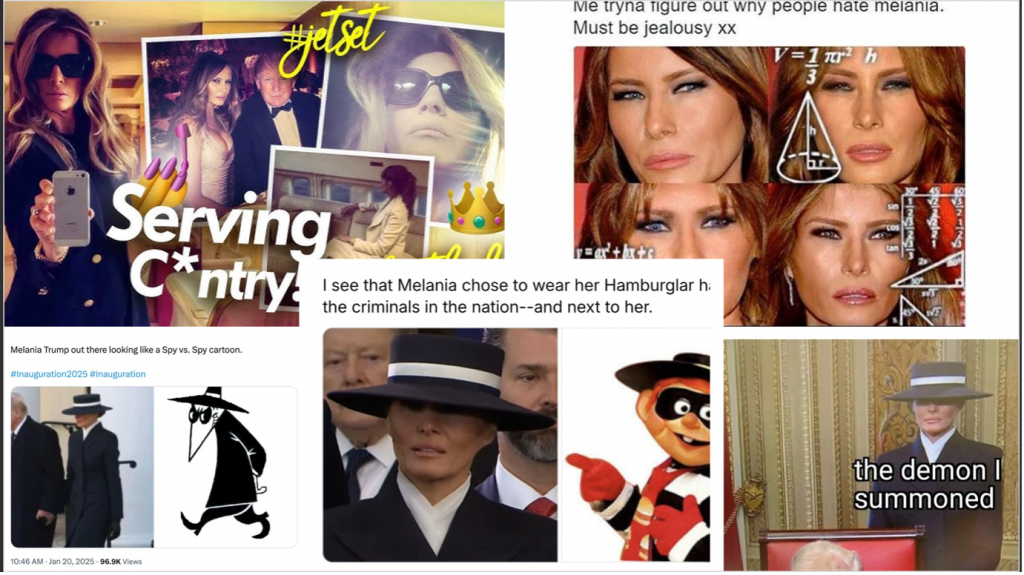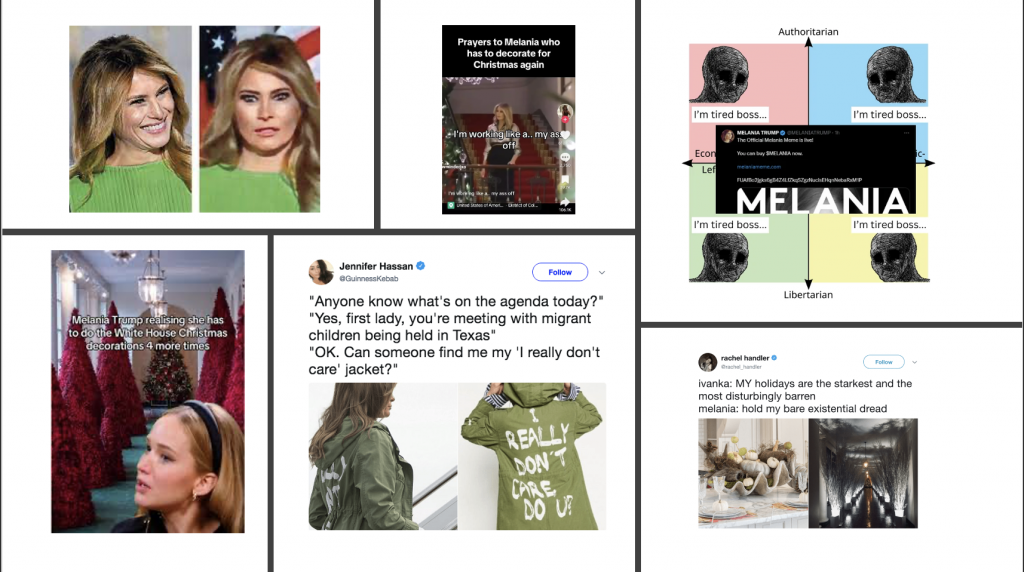In the internet age, few figures have been subject to as much meme-driven mythmaking as First Lady Melania Trump. Mimi Mihăilescu argues that Melania memes reveal how humour and speculation can obscure the complexities of real-life individuals. They also reinforce harmful stereotypes and detach serious political discourse from reality
Meme culture delights in hijacking Melania Trump's carefully curated public image. Her fashion choices are a particularly potent catalyst. The 2025 inauguration provided the latest meme sensation: Melania's oversized hat and black coat drew comparisons with everything from Dark Maga to 'mob wife at a funeral'. She certainly exuded a diva-like aura. All of which prompted the viral question: Who is this diva?

Netizens have assigned to Melania a 'diva' aesthetic which romanticises her aloof demeanour and polished appearance. But this portrayal has troublesome implications. The internet sees Melania not as a nuanced individual but a caricature of wealth, detachment, and glamour. This perpetuates harmful stereotypes about women in the public eye, especially women from former communist countries.
The internet sees Melania as a caricature of wealth, detachment and glamour, perpetuating stereotypes about women from former communist countries
The diva memes continue the internet's fascination with Melania's fashion choices — including the infamous I really don’t care, do u? jacket — which have been shared to exhaustion. Such memes are often detached from their original context and repurposed to raise a laugh. The hat meme succeeds because of the internet’s fascination with Melania’s enigmatic expressions and sartorial symbolism. But it also reduces her public image to an aesthetic trope, merely a glamorous prop in the spectacle of politics. FLOTUS has been commodified yet further by the newly minted cryptocurrency, $Melania and $Trump meme coins.
Closely tied to her diva persona is Melania’s alignment with the so-called brat aesthetic on platforms like TikTok and X. Younger generations have adopted this aesthetic — a mix of unapologetic vanity, confidence, and disdain. People of this age tend to view Melania as a symbol of rebellion against traditional expectations of femininity. They celebrate her viral quotes, such as Who gives a fuck about Christmas stuff and decorations, but I need to do it, right? as emblematic of a relatable, if exaggerated, disdain for societal norms.

Yet this framing obscures the problematic realities of Melania’s position. Celebrating her as a rebellious 'brat' ignores the complicity inherent in her role as First Lady during one of the most polarising presidencies in US history. Internet culture’s tendency to flatten figures into memes erases the political and ethical dimensions of their actions. The result is a sanitised, palatable version of that person's public persona.
Netizens frequently scrutinise Melania's facial expressions, interpreting them as displays of disdain for her husband. Her expressions have spawned the kind of memes that portray Melania as a victim of her marriage. Meme-creators share videos of Melania swiftly retracting her hand or appearing visibly uncomfortable at public events, as evidence of her supposed loathing. Creators often frame such moments as empowering gestures or evidence of resistance. They reinforce a narrative in which Melania is trapped in an undesirable relationship, yet covertly subversive.
So, some memes frame Melania as a victim of intimate harm, whether through her marriage or the media’s relentless coverage. But others portray her as a mastermind exploiting her feminine wiles to influence her husband. Both interpretations reduce the woman to a caricature, stripping away nuance and reducing her choices to a binary: victimhood or manipulation. Of course, these interpretations can be very funny. Yet they risk trivialising the dynamics of an intimate partnership under intense public scrutiny. They also obscure the reality that Melania has consistently defended and supported her husband’s policies and public stances; evidence that she does indeed have agency in their relationship.
Some memes portray Melania as a victim of an unhappy marriage, others as a mastermind exploiting her feminine wiles. Both interpretations reduce her to a caricature
Some interpret reports of her ironclad prenuptial agreements and carefully staged public appearances as acts of agency. These people argue that Melania is showcasing her ability to navigate a high-stakes marriage for personal benefit. But by focusing solely on curated moments of perceived discomfort, the internet perpetuates a selective narrative that erases Melania's active participation in Trump’s political life.
Perhaps the most ironic twist in Melania’s meme-driven persona is the fact that some Democrats have, reluctantly, adopted her as an icon. They see evidence of her disdain for Donald and hear rumours of her secret support for Democrats like Kamala Harris. And, indeed, Melania has gone on record to defend abortion rights. Democratic-icon Melania memes celebrate her as a symbol of quiet resistance, even feminist rebellion. By casting her as an unwitting ally, Democrats risk diluting their principles and trivialising the stakes of political discourse. This phenomenon also highlights how internet culture’s obsession with irony can blur the line between critique and endorsement.
Seeing evidence of her disdain for Donald and rumours of her secret support for Kamala Harris, some Democrats have, reluctantly, adopted Melania as an icon of quiet resistance
The memeification of Melania Trump underscores the broader dangers of crafting public personas from fragmented, often humorous depictions. Memes can be a powerful tool for social commentary. But they also risk oversimplifying complex figures, particularly women in positions of influence. Memes reflect a cultural tendency to flatten nuanced individuals into digestible, shareable narratives. They reinforce gendered stereotypes, perpetuate harmful binaries of victimhood and agency, and detract from substantive critiques of their actions and roles. This shifts focus from meaningful political discourse to superficial aesthetics and viral moments, undermining the gravity of pressing political issues.
Melania Trump’s meme-driven diva image reveals more about internet culture than it does about the woman herself. It highlights our collective fascination with crafting narratives that blend victimhood, agency, glamour, and rebellion, often at the expense of nuance. As we navigate the intersection of politics, gender, and intimacy in the digital age, it is crucial to recognise the limitations and dangers of relying on memes as a primary lens through which we look at public figures. We must critically engage with the complexities of such figures' lives and roles. And we must resist the allure of humour and spectacle in favour of a more informed and nuanced perspective.